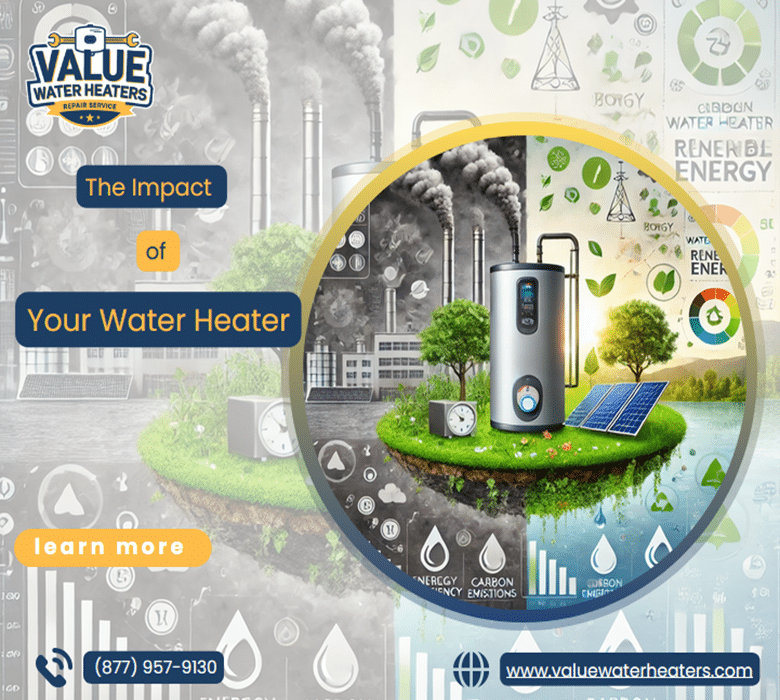Environmental impact of water heater usage is often overlooked, yet it significantly affects energy consumption and carbon emissions. Traditional water heaters contribute to high electricity or gas usage, increasing your household’s carbon footprint. However, making eco-friendly choices can reduce environmental harm while saving you money on utility bills.
In this article, we’ll explore the environmental impact of water heater systems and provide five revolutionary tips to help you make sustainable choices.
1. Environmental Impact of Water Heater: Energy Consumption
A major factor in the environmental impact of water heater use is energy consumption. Traditional tank water heaters continuously heat and store water, consuming large amounts of electricity or gas. This results in:
- Higher greenhouse gas emissions, contributing to climate change
- Increased energy bills, due to standby heat loss
- More reliance on fossil fuels, depending on your energy source
To reduce the environmental impact of water heater usage, consider switching to an energy-efficient model, such as a tankless or heat pump water heater. These systems heat water on demand, reducing energy waste and lowering emissions.
2. Environmental Impact of Water Heater: Water Waste
Many homeowners don’t realize that water heaters contribute to water waste. Older or inefficient systems:
- Take longer to heat water, leading to wasted water while waiting for it to reach the desired temperature
- Store excess hot water, which can cool down and require reheating
- May leak, leading to unnoticed water loss over time
To minimize water waste and reduce the environmental impact of water heater systems, try these solutions:
- Install low-flow fixtures to conserve water
- Use a recirculation pump to deliver instant hot water
- Choose a high-efficiency water heater to reduce heat loss
3. Environmental Impact of Water Heater: Carbon Emissions
The environmental impact of water heater usage extends beyond energy consumption—it also affects carbon emissions. Gas-powered water heaters burn fossil fuels, releasing carbon dioxide (CO₂) into the atmosphere. Even electric models contribute to emissions if your electricity comes from non-renewable sources.
To lower carbon emissions, consider:
- Switching to a solar water heater for a renewable energy solution
- Using a heat pump water heater, which is 2-3 times more efficient than traditional models
- Purchasing green energy from your utility provider to power your heater sustainably
Making these adjustments can significantly reduce the environmental impact of water heater usage in your home.
4. Environmental Impact of Water Heater: Lifespan and Waste
Water heaters have a limited lifespan, typically lasting 10-15 years. When they break down, many units end up in landfills, contributing to metal waste, insulation materials, and hazardous components.
To extend the lifespan of your water heater and reduce waste:
- Perform regular maintenance to prevent early breakdowns
- Flush your tank annually to remove sediment buildup
- Replace the anode rod periodically to prevent corrosion
- Recycle your old unit responsibly through a certified disposal program
These steps can help reduce the environmental impact of water heater disposal and lower unnecessary waste.
5. Environmental Impact of Water Heater: Eco-Friendly Upgrades
Investing in eco-friendly upgrades is one of the best ways to minimize the environmental impact of water heater use. Consider these sustainable choices:
- Tankless Water Heaters: Heat water only when needed, eliminating standby heat loss
- Heat Pump Water Heaters: Use ambient air to heat water efficiently
- Solar Water Heaters: Rely on renewable solar energy instead of fossil fuels
- Smart Water Heaters: Optimize energy usage based on household demand
Upgrading to these green technologies can cut down on energy consumption, lower emissions, and reduce environmental harm.
Final Thoughts on the Environmental Impact of Water Heater Use
Understanding the environmental impact of water heater systems is key to making eco-conscious choices. By switching to energy-efficient models, reducing water waste, lowering carbon emissions, and maintaining your system properly, you can make a significant difference in reducing your household’s ecological footprint.
If you’re considering eco-friendly water heater upgrades, visit our website. You can also find us on Google Maps, Bing Maps, Yahoo Local, or check customer reviews on Yelp.





